Building a dry creek bed is a practical and beautiful solution to a yard with poor drainage. A dry river bed is a trench filled with rocks and is meant to look like a riverbed that has dried up.
They can help with erosion and those areas of the yard that never dry out.
Check out the twenty-nine dry riverbed landscaping ideas we’ve put together for inspiration. Some are practical, while others are a simply beautiful addition to a yard.
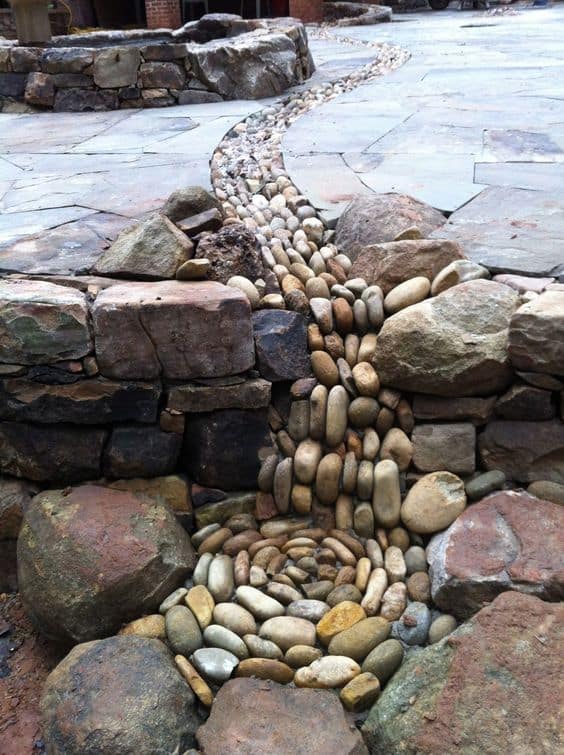
A dry creek is a great solution for an uneven patio.
A drain system filled with river rocks leads to a pool of swirling stones.
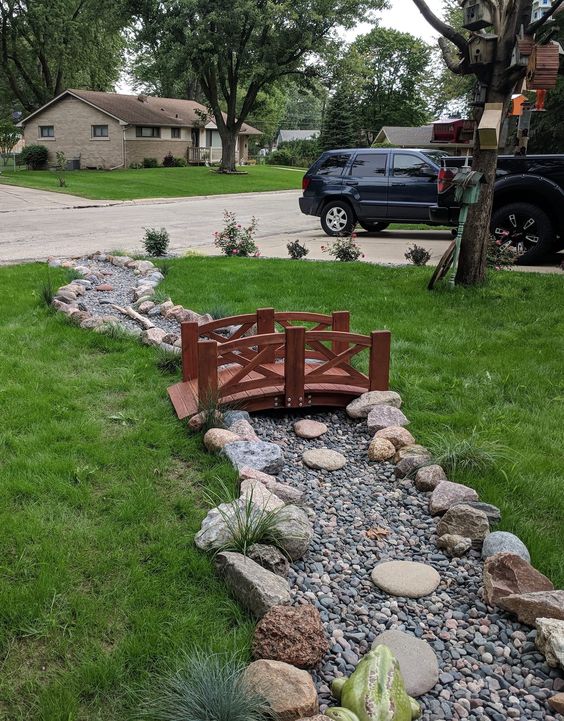
Some creek beds are more about fun than function. This dry creek bed combines both by adding a little footbridge over the French drain.
Flat, round stones mimic the look of a path of lily pads, tempting a ceramic frog.
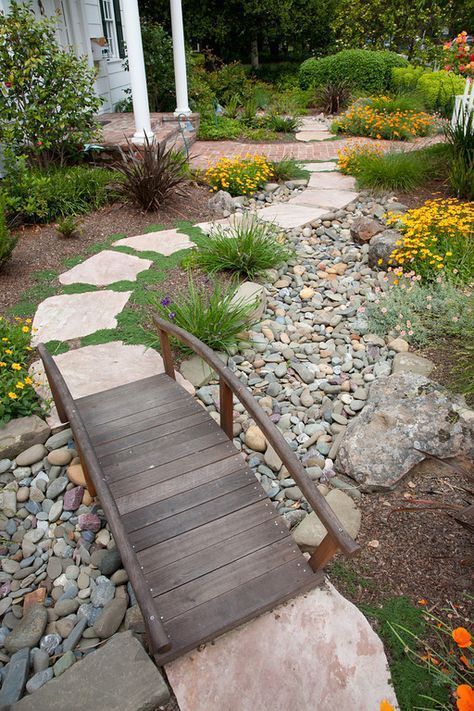
The flagstone path with a little footbridge intersects this French drain in a couple of areas.
Using a contoured path with irregularly shaped stepping stones creates an informal look where a few scattered flowers in the riparian zone are expected and forgiven.
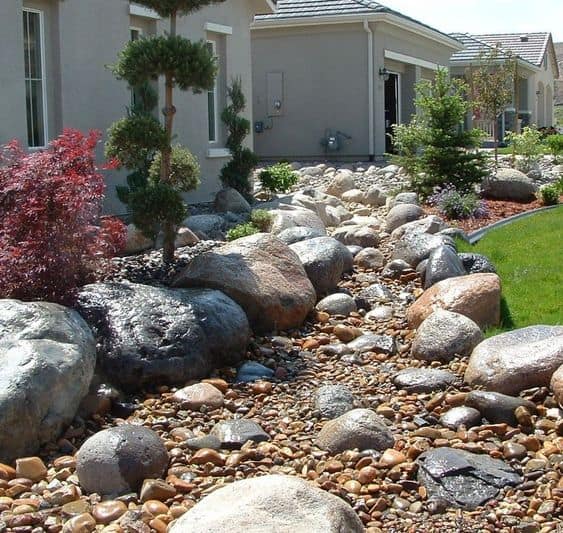
Boulders and large rocks form the focal point of this creek bed. Smaller river rocks fill the bed.
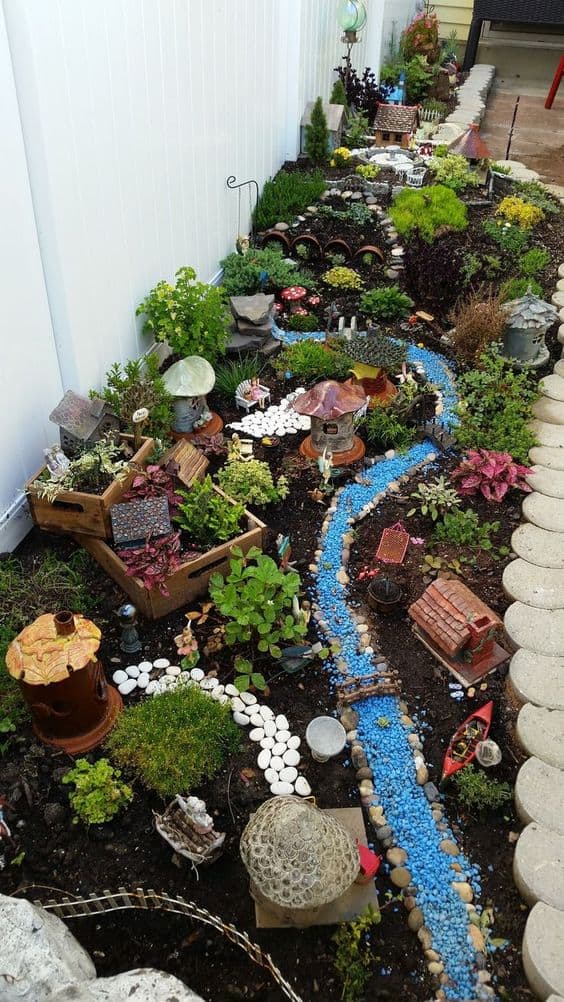
Some dry streams are all about fun and fantasy. Fresh sky blue pebbles are a standout feature in this miniature village.
The little stream extends nearly the entire length of this side garden bed.
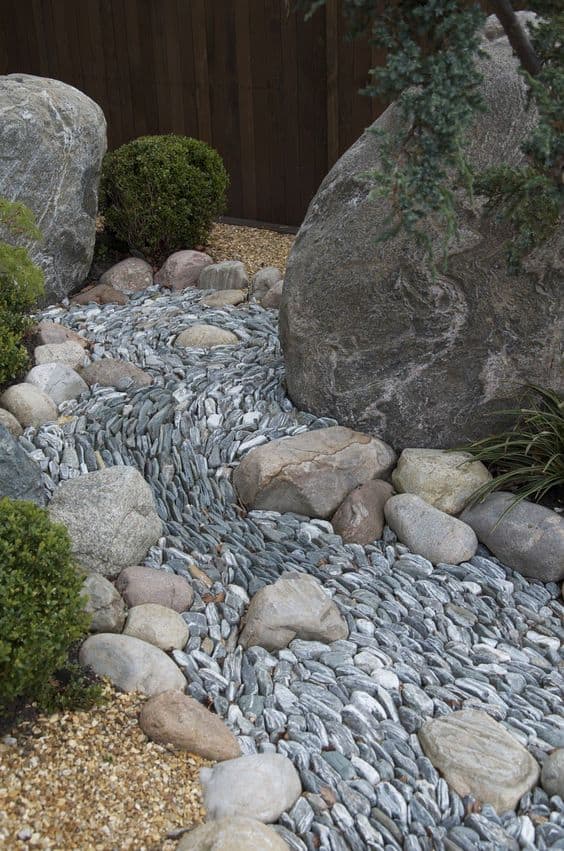
This dry creek bed looks realistic, with river rocks on its sides.
Larger rocks work as obstacles that create the look of conflicting currents.
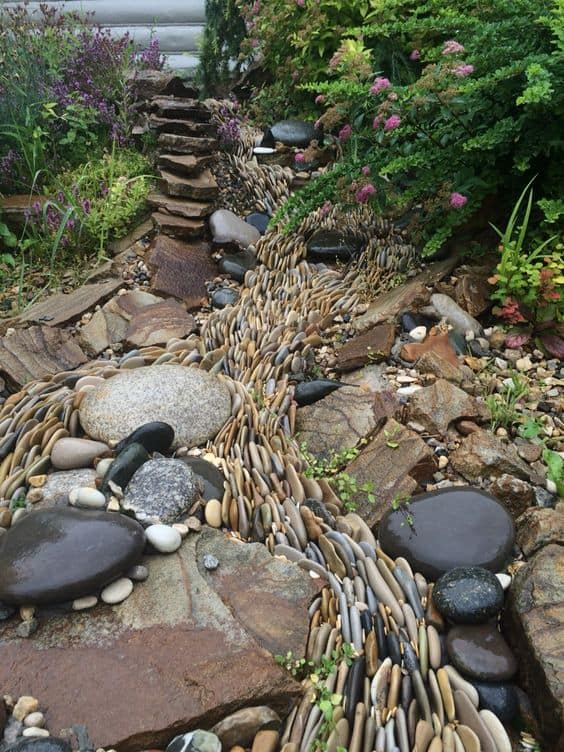
Flagstones line the banks of this creek bed. River rocks are set on their side to create the illusion of water rushing downstream.
Some people prefer to set the rocks in place using mortar, but it’s labor intensive and unnecessary if you set it up properly.
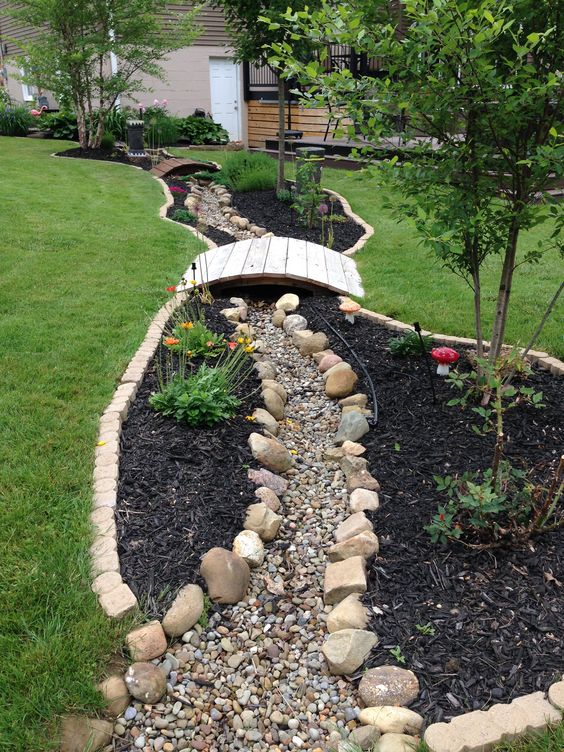
A French drain becomes the feature element in the middle of the lawn. The black mulch acts like a riparian zone with trees and flowers in all areas.
The garden is edged with cast bricks and round granite acting like a riverbank. Small, smooth gravel fills the bed.
Two footbridges allow for easy access to both sides of the yard.
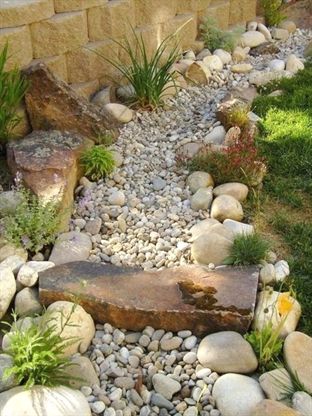
A large irregular brick was dropped in the middle of this dry creek bed as a crossing point between two sections in the garden.
Larger rocks line the riverbanks of this bed.
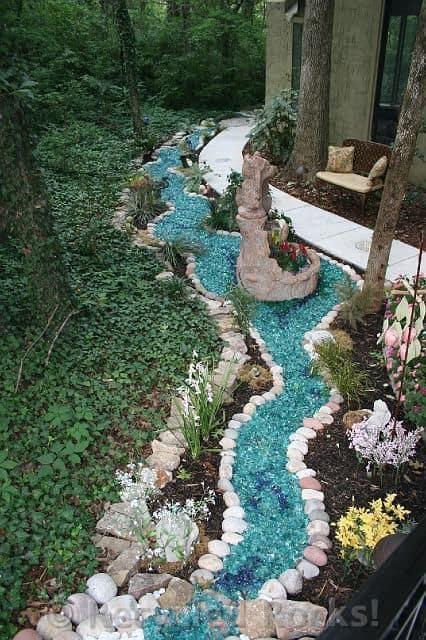
A creek bed was created using turquoise-colored gravel you can find at any pet store. Its bank is lined with pale rocks.
Anyone sitting on the bench near the house will hear the soothing sound of bubbling water from the fountain.
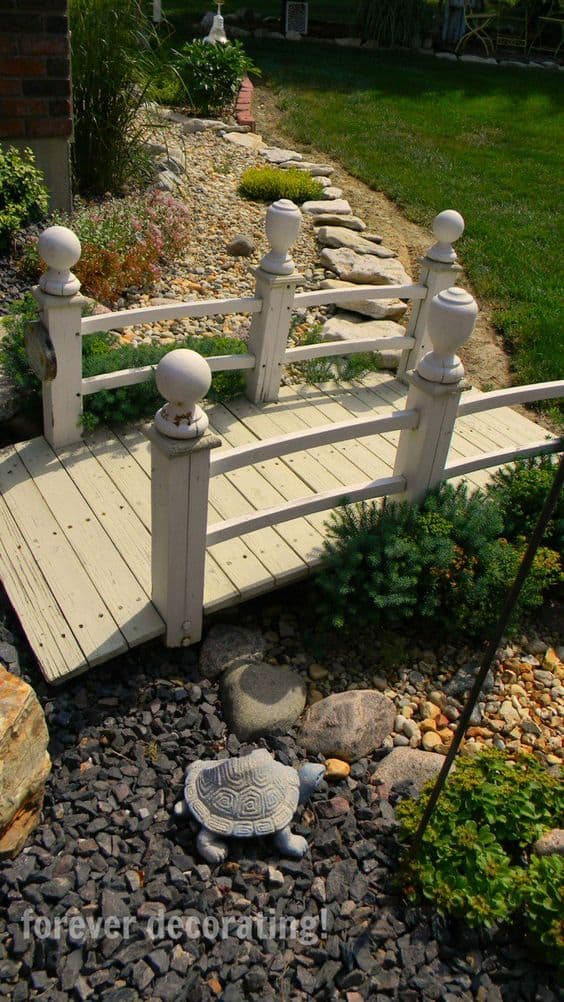
This dry creek bed was built near a berm so it does work to prevent soil erosion. Different colors of rocks or used in different areas under the bridge. Flagstone is set on the bank to prevent erosion. Ornamental grasses soften the look of this drain.
You can save yourself a lot of money by building the bridge yourself like this homeowner did.
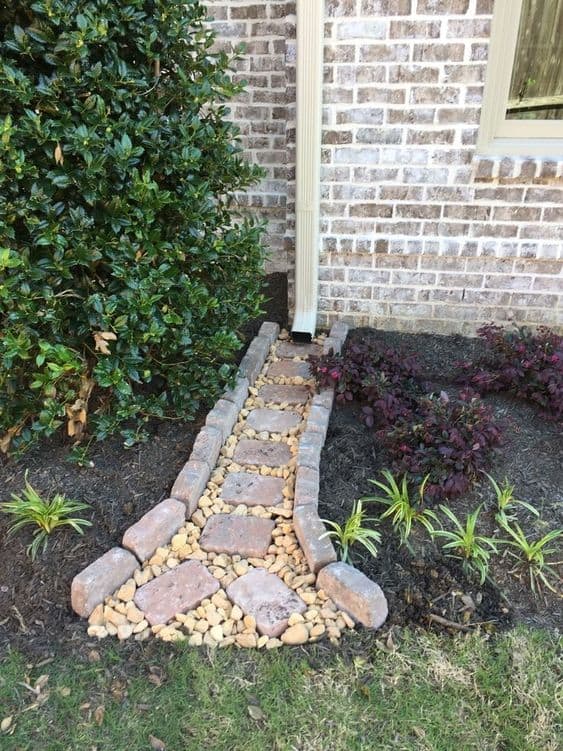
Prevent water from flooding the garden beds by lining up bricks on their sides along the creek bed.
This trench is a little deeper than ground level. Bricks are a great way to absorb moisture while blocking runoff from the downspout.
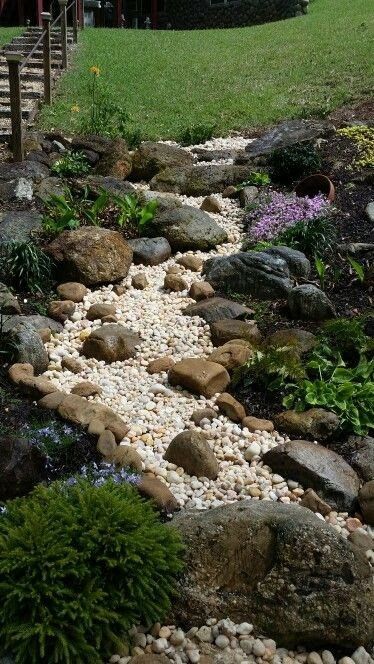
A creek bed looks more realistic when you add a few boulders and large rocks in with smaller rocks.
These form eddies and pillows where trout would rest and feed.
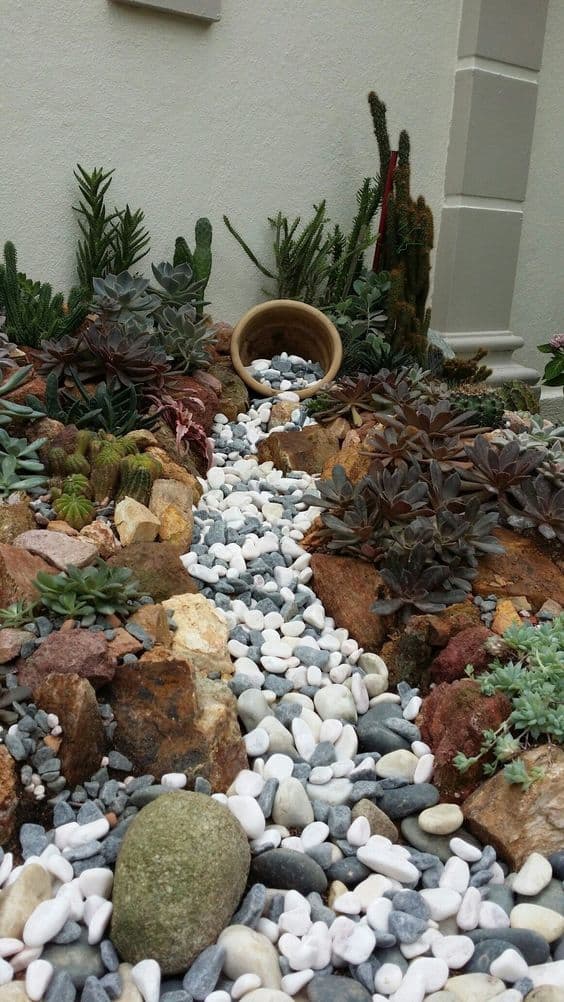
A dry stream is made of a blend of white and gray river rocks. Succulents and cacti substitute for moss and shrubs that would have been found in a forest riparian zone.
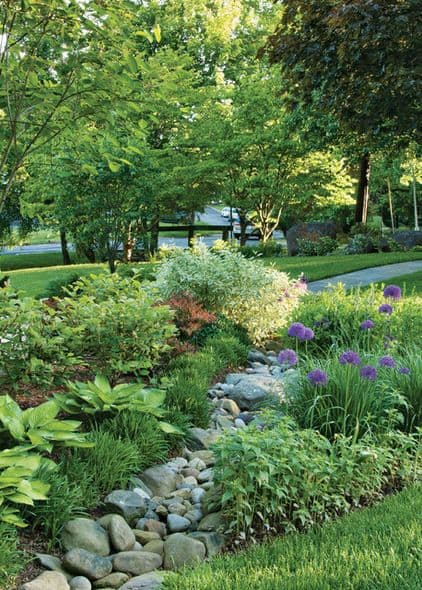
Larger rocks and boulders work in a dry riverbed. Choose rocks of a similar color.
Vegetation in the area around a riverbank is called the “riparian zone.”
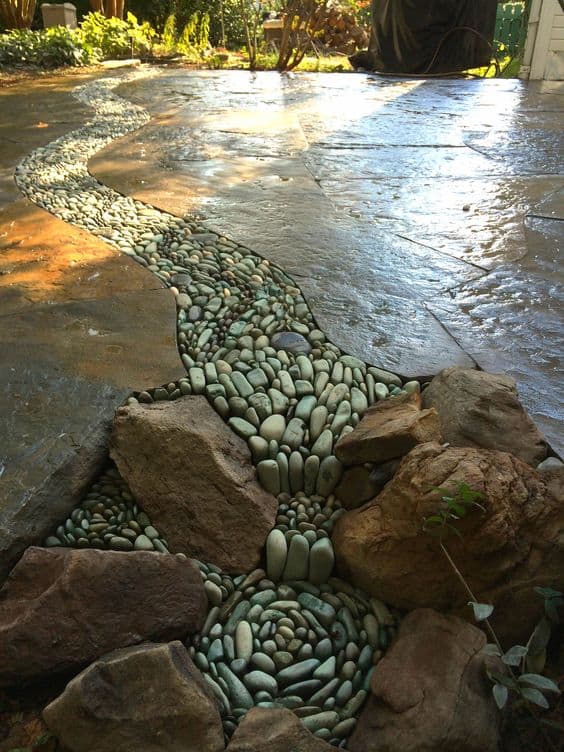
Another idea for adding a dry creek in a flagstone patio that’s complete with a fall zone and eddy.
The larger rocks are more irregular, but a tiny stream of pebbles flows in the middle.
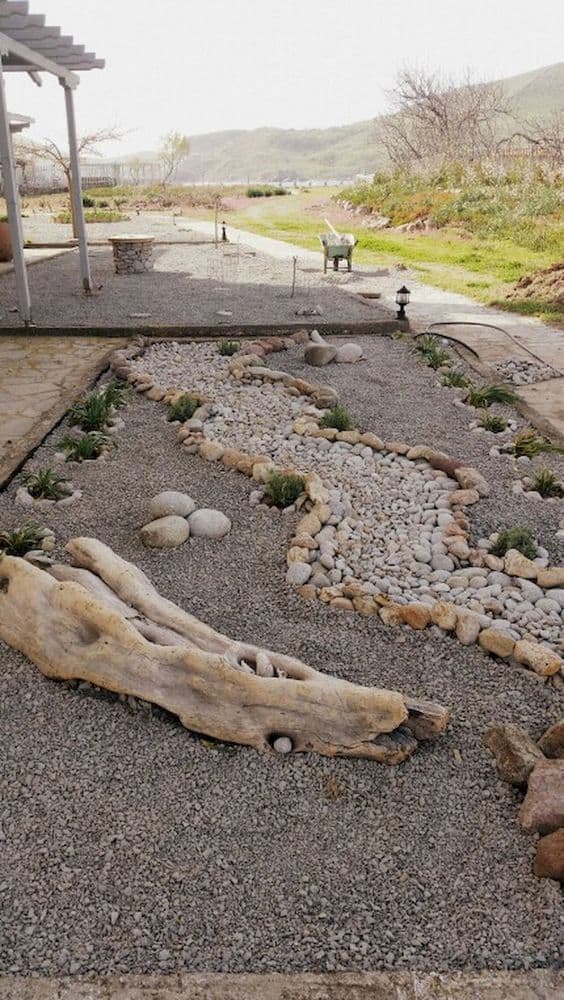
Hardscaping yards are becoming more common as we recognize that our water resources need to be protected.
Smaller succulents provide green foliage.
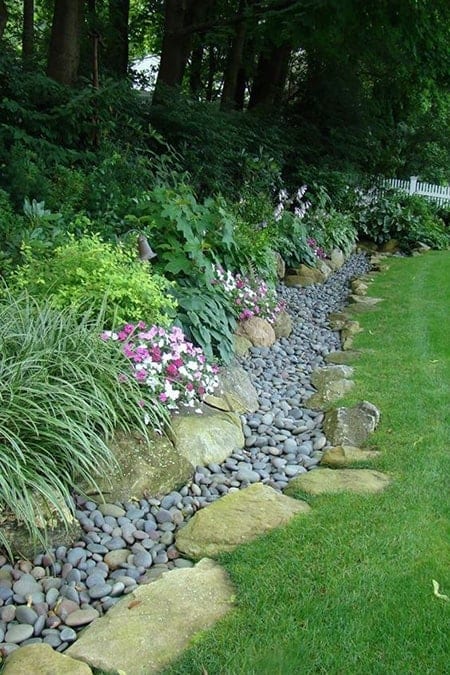
Boulders and large, flat stones can be used along the banks of a creek bed to control erosion.
The channel is made obvious with the use of light gray river rocks.
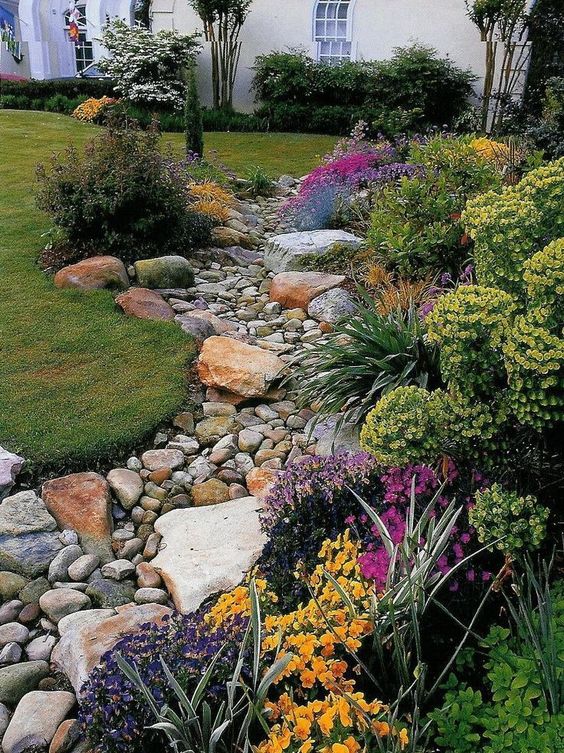
Convert your dry river bed to a French drain if the water continues pooling. Larger rocks along the bank of this garden keep the soil from being washed away.
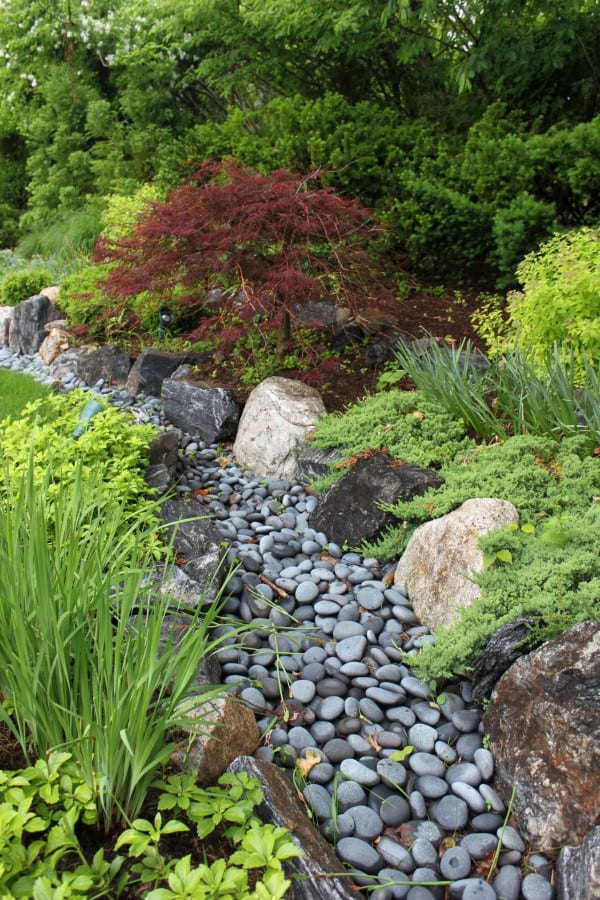
A French drain is a trench with a pipe covered by rocks. This dry stream bed looks like it was created naturally. Boulders and large rocks work to prevent erosion.
Tall grasses and moss growing around the rocks also help with drainage. Gray river rocks are often used in dry riverbed landscaping.
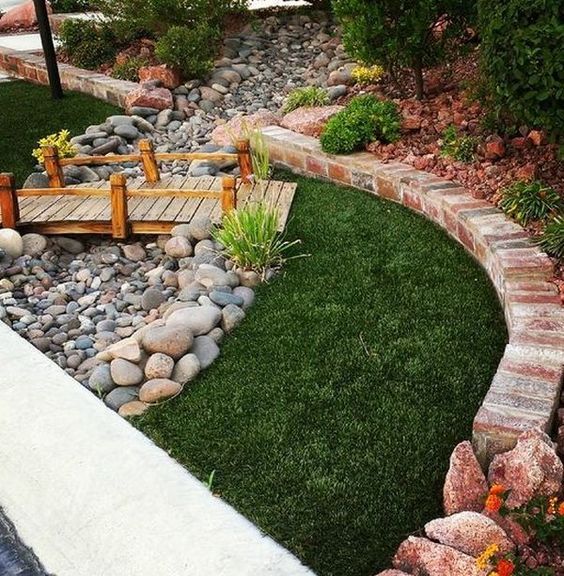
A French drain was a necessity in this garden. Bricks along the edging were removed to make way for the smaller rocks with large river rocks forming the banks.
The footbridge is as much a necessity as it is a nice feature in the yard.
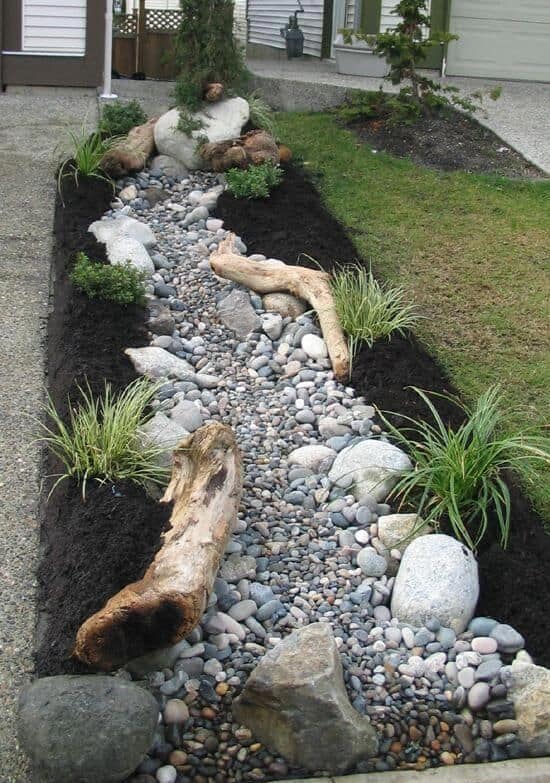
Gray gravel and river rocks were added to black soil to create an interesting dry stream path along the driveway.
The contrast between black and white is a modern touch. The large driftwood pieces add more color and dimension.
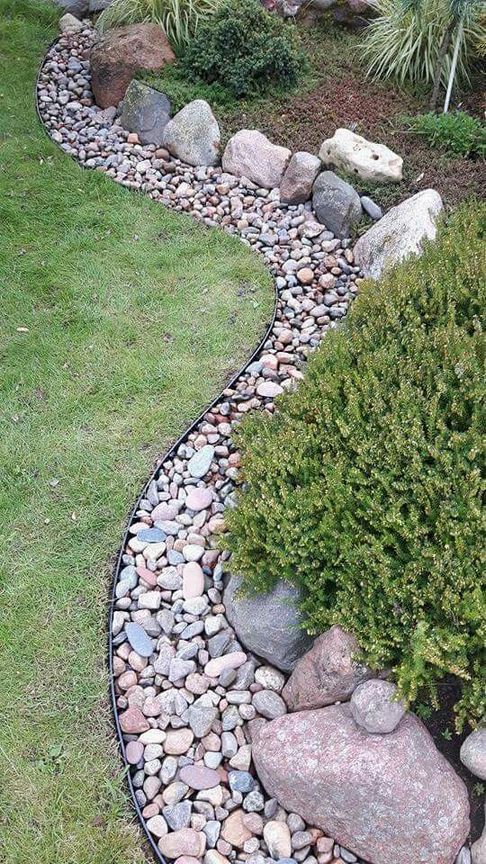
When planning your dry streambed, notice where the rain water collects naturally. Use this line to determine where the grass ends and the garden bed begins.
Boulders are placed on one side of the bed where water collects. This prevents erosion and forces the water to continue down the trench. Polyvinyl edging works to prevent backflow into the grass.
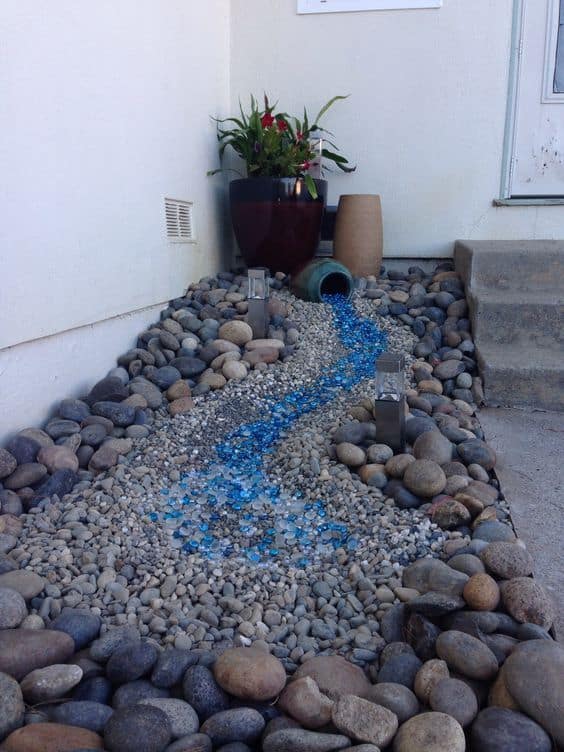
Blue and white crystals form the illusion of being the deepest part of this creek bed.
The illusion moves from larger rocks on the perimeter to the smallest in the center.
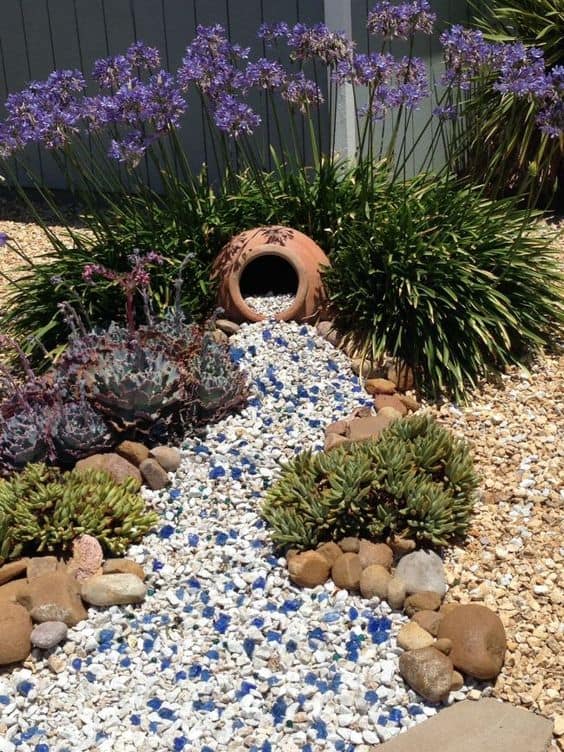
White gravel speckled with blue granite forms the basis of this dry stream bed. Ornamental grasses and local flowers provide the backdrop.
The drain’s riverbed, with its large terracotta pot, is the centerpiece of a rock garden covered in pea gravel.
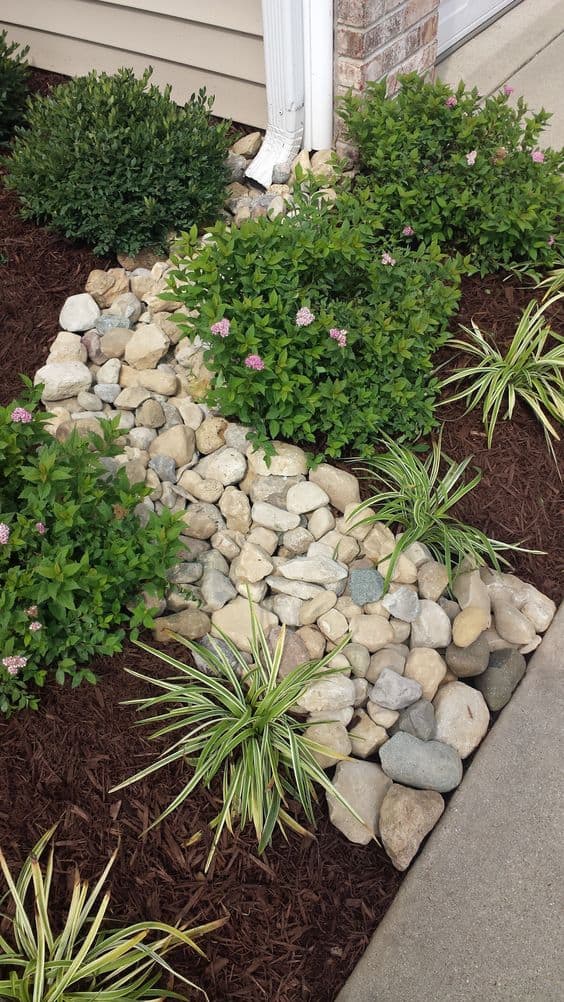
Rainwater doesn’t have to follow a path in the yard.
You can use a dry creek bed to direct water from a downspout. Rocks help with drainage and also hold moisture the plants will use later.
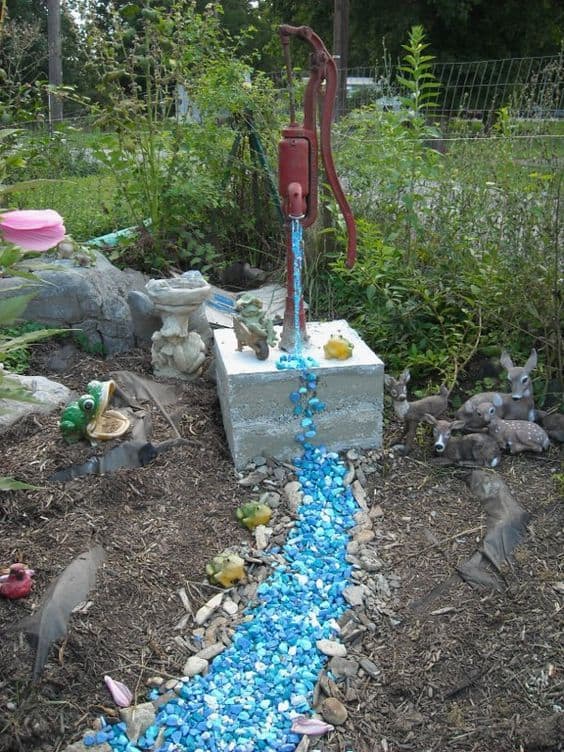
Incorporate your favorite antiques into your garden. This water pump looks like it’s pouring water down a creek bed in this woodland scene. The water is created with colorful resin.
The creek bed is made of a combination of white, sky blue, and turquoise-colored pebbles. A few light-colored rocks create a riverbank in the mulch.
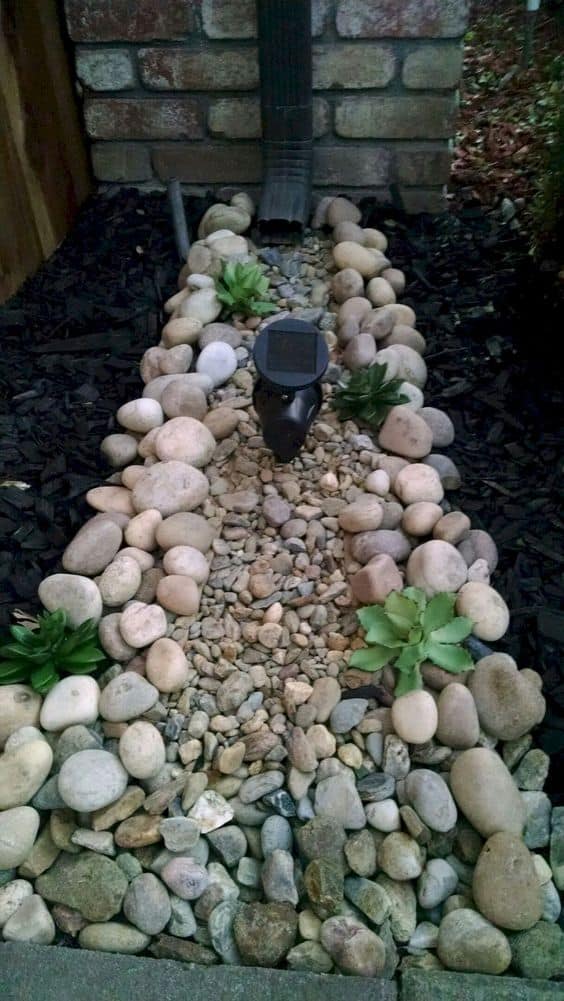
Create an entire water feature around a downspout.
Larger rocks make up the riverbank and small crushed stone works as the main channel. Small plants dot the banks.
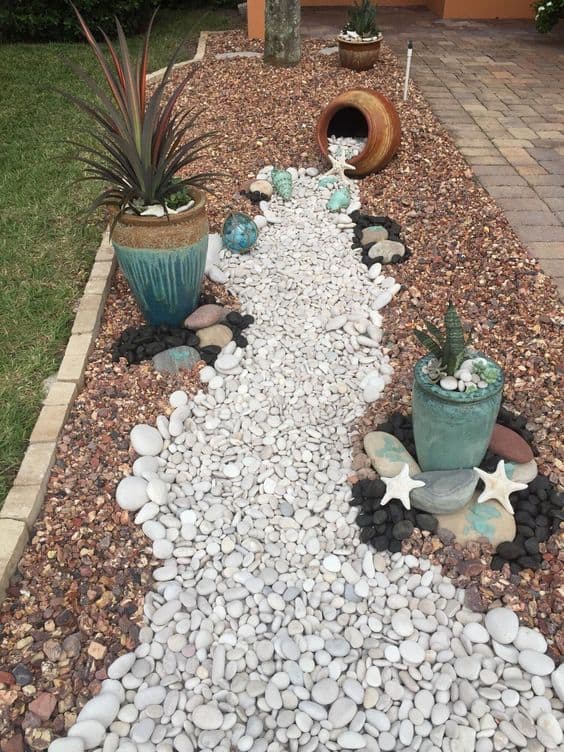
Decorative creek beds don’t need drainage, so there’s no need for a deep trench. In this case, you can use more expensive rocks such as marble. White marble is used as the water channel alongside pea gravel.
Succulents planted in planters can be changed. Lava rocks and garden decorations like glass ball add to the fun.





